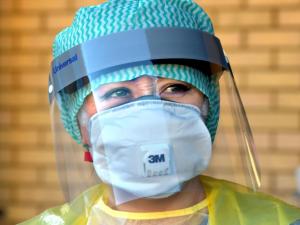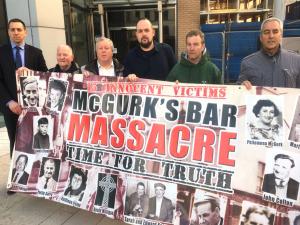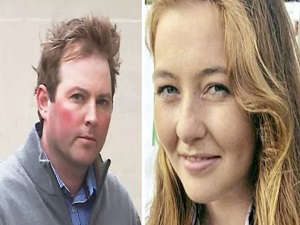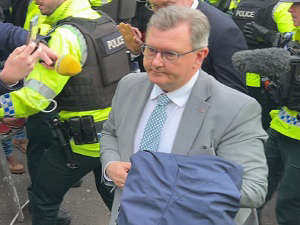
By Q Radio News and PA Reporters
The rate of increase of Covid-19 cases in Northern Ireland has “slowed considerably” from last week, Stormont Health Minister Robin Swann has said.
However, speaking at an Executive media conference, Mr Swann said the virus had been “growing exponentially in our society with potentially catastrophic consequences for many individuals and families as well as our own health service and indeed our own economy”.
He said within days Northern Ireland will exceed the highest number of hospital admissions experienced in the first wave of the pandemic, adding: “This is how grave our current situation is.”
Defending tougher restrictions introduced last week, Mr Swann said “sitting back and letting Covid rip unchecked through our community would have been a total abdication of responsibility”.
“Restricting human contacts is a proven way of fighting back at Covid-19,” he added
“If we are not going for a full lockdown then restrictions have to be targeted, however complicated that may be, because I have yet to see any real or feasible alternatives to the action that we are now taking.
“Some who are active on the airwaves need to think about that. I am deeply worried about the economic consequences of the pandemic and the actions being taken in response. My heart goes out to the workers and employers who bear the brunt of that.”
Robin Swann also said 83 care homes have confirmed Covid-19 outbreaks.
“This is a huge concern to me and should be to everyone,” he said.
“The blunt truth is that widespread community transmission makes it increasingly hard to keep care homes safe.
“We cannot throw a ring of steel around homes and cut them off entirely from the wider community because quality of life must be balanced with protection of life. However there are steps that we can take and, following the rapid learning initiative that was led by our chief nursing officer, our care home surge plan has been updated and refreshed.”
Mr Swann paid tribute to the work of care staff and said his department is finalising a business case for increased pay for the sector.
“That will be challenging, given the current financial pressures and uncertainties, to meet these costs. It will need Executive support but I am determined to do my best to make that happen.”
Mr Swann also announced plans for an additional £27 million of funding for care homes to support the costs of the Covid-19 testing programme.
Northern Ireland’s chief scientific adviser Professor Ian Young said there is a “little chink of light” in the fight against coronavirus in that the rate of increase of Covid-19 cases has begun to slow, “likely to reflect the impact of the Northern Ireland-wide household restrictions” and additional restrictions in the Derry and Strabane council area.
He said there remains at a high rate of testing in the region compared with other parts of the UK and Ireland – close to 30 people out of every 1,000 of the population over the last seven days.
The percentage of positive tests is continuing to rise and is at least 13%.
“This is also showing signs of slowing somewhat but remains at an extremely high level,” he said.
Prof Young said the R number is around 1.4, with the aim of reducing it below 1, as close as possible to 0.7.
He said Derry and Strabane continues to have the highest number of cases per 100,000.
Professor Ian Young also said more scientific evidence on the pandemic will be published on the Department of Health website.
“I think it is important that we make as much evidence available to the public,” he said.
“This is just the beginning, we will be adding a great deal more to the evidence as new evidence emerges.”
Prof Young said much focus has been on one summary document, and urged that it is not looked at in isolation but to “look at the totality of the evidence”.
He said small changes to the R number become “particularly acute when R gets close to 1”.
“R at present is at 1.4, we need it to fall to below 1, to at least 0.9 and preferably 0.7,” he said.
“Individual interventions may have a small impact on R but we need to take all of the interventions we can get because it is the collective impact which is going to count.
“Small changes in R are really important as we try to combat the course of this epidemic. Everyone who can contribute something to reducing R is making a real difference to what will happen in the future.”


 Swann refuses to rule out resigning if budget is not changed
Swann refuses to rule out resigning if budget is not changed
 Fresh inquests ordered into deaths of 15 killed in McGurk’s bomb blast
Fresh inquests ordered into deaths of 15 killed in McGurk’s bomb blast
 Trial ends after man accused of murder of young showjumper is found dead
Trial ends after man accused of murder of young showjumper is found dead
 A brief hearing and chaotic scenes as Donaldson makes first court appearance
A brief hearing and chaotic scenes as Donaldson makes first court appearance